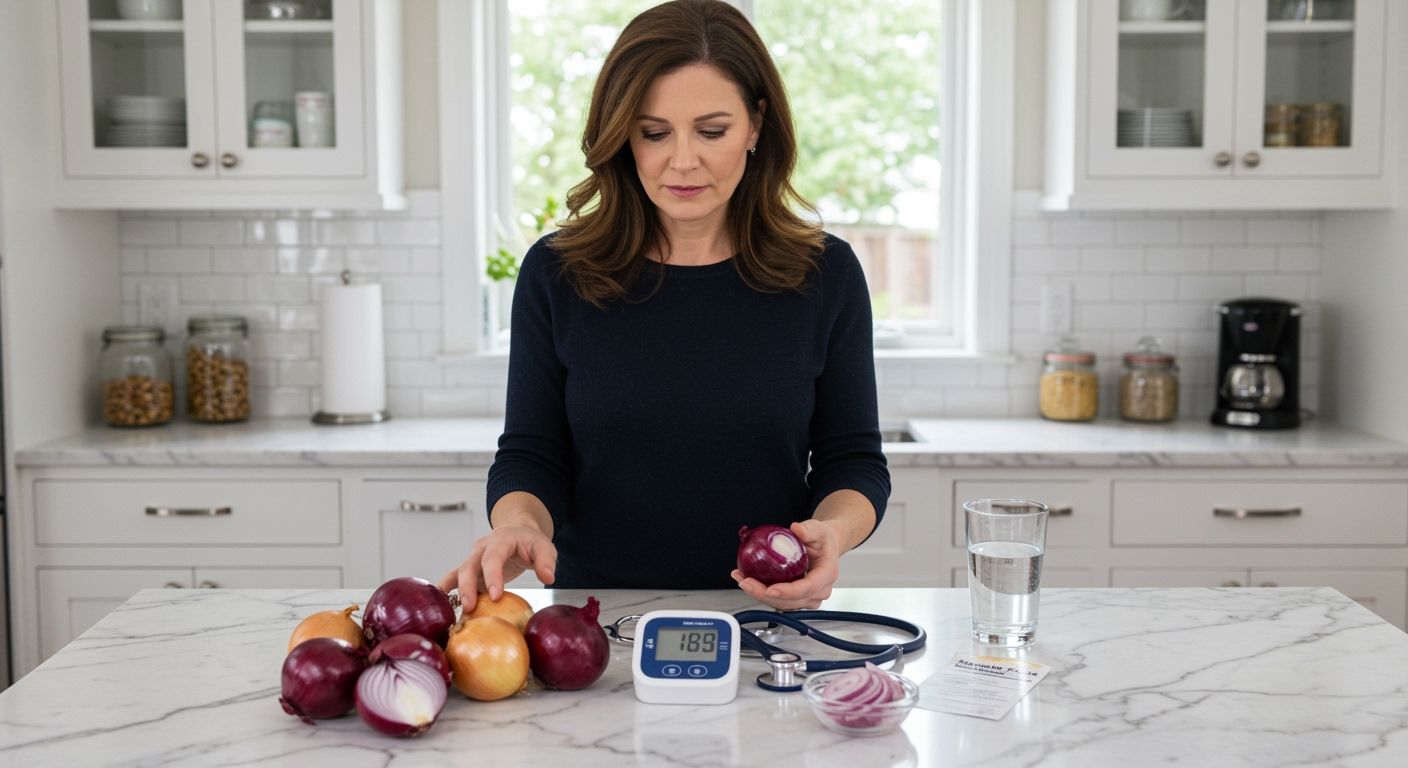✪ Key Takeaway: Low blood pressure patients should limit onion intake as compounds in onions can further reduce blood pressure levels.
Introduction
Your doctor just told you that your blood pressure readings are consistently low, and now you wonder about every food choice you make.
You might be questioning whether that onion-heavy curry or those caramelized onions on your burger could be making your hypotension worse.
Hi, I am Abdur, your nutrition coach, and today I am going to explain exactly how onions affect your blood pressure and whether you need to avoid them completely.
How Do Onions Actually Lower Blood Pressure?
Onions contain powerful sulfur compounds called allyl sulfides that directly impact your cardiovascular system.
These compounds work by relaxing your blood vessel walls and improving blood flow throughout your body.
When you eat onions, these sulfur compounds get absorbed into your bloodstream and trigger the release of nitric oxide.
Nitric oxide is a natural chemical that tells your blood vessels to widen and relax.
This vasodilation effect reduces the pressure inside your arteries, which is great for people with high blood pressure but problematic for those with low blood pressure.
Research shows that regular onion consumption can reduce systolic blood pressure by 3-5 mmHg in healthy individuals.
✪ Fact: Raw onions contain higher concentrations of blood pressure-lowering compounds than cooked onions.
What Happens When You Have Low Blood Pressure And Eat Onions?
If your blood pressure is already low, adding onions to your diet can push your readings even further down.
Normal blood pressure ranges from 90/60 mmHg to 120/80 mmHg, and anything below 90/60 mmHg is considered hypotension.
When you consume onions with low blood pressure, you might experience dizziness, lightheadedness, or even fainting spells.
Your brain needs adequate blood flow to function properly, and when your blood pressure drops too low, your brain does not get enough oxygen-rich blood.
This can lead to symptoms like fatigue, blurred vision, nausea, and difficulty concentrating.
The timing matters too – eating a large amount of raw onions on an empty stomach can cause a more dramatic drop in blood pressure than eating small amounts with other foods.
✪ Pro Tip: Monitor your blood pressure for 2-3 hours after eating onion-rich meals to track your individual response.
Should You Completely Avoid Onions With Hypotension?
Complete avoidance is not necessary, but you need to be strategic about your onion consumption.
Small amounts of cooked onions are generally safer than large portions of raw onions for people with low blood pressure.
Cooking breaks down some of the sulfur compounds, reducing their blood pressure-lowering effects.
You can safely include about one tablespoon of cooked onions in your meals without significant blood pressure changes.
Avoid eating raw onions in salads, sandwiches, or as garnishes if your blood pressure readings are consistently below 90/60 mmHg.
Pay attention to your body signals – if you feel dizzy or weak after eating onion-containing foods, reduce your portion sizes further.
Consider eating onions with foods that naturally support blood pressure, such as salty snacks or caffeinated beverages.
✪ Note: Yellow onions contain more blood pressure-lowering compounds than white or red varieties.
What Are Better Food Choices For Low Blood Pressure?
Instead of focusing on onions, choose foods that naturally help raise blood pressure to healthy levels.
Salty foods like pickles, olives, and cheese can help increase your blood volume and raise blood pressure readings.
Caffeinated beverages such as coffee and tea provide a temporary blood pressure boost by constricting blood vessels.
Foods rich in vitamin B12 and folate, like eggs and leafy greens, support healthy blood cell production.
Adequate water intake is crucial because dehydration can worsen low blood pressure symptoms.
Small, frequent meals prevent blood pressure drops that often occur after large meals.
Consider adding ginger and cinnamon to your foods, as these spices can help improve circulation without lowering blood pressure like onions do.
✪ Pro Tip: Eat a small salty snack 30 minutes before meals to prevent post-meal blood pressure drops.
The Bottom Line
Low blood pressure patients should limit their onion intake, especially raw onions, as they can further reduce already low blood pressure levels.
Smart nutrition means knowing when to say no to healthy foods that do not fit your specific health needs.
I would love to hear about your experiences with onions and blood pressure in the comments below – have you noticed any changes in how you feel after eating onion-rich meals?
References
At NutritionCrown, we use quality and credible sources to ensure our content is accurate and trustworthy. Below are the sources referenced in creating this article:
- PMC: Nutritional and Health Benefits of Onions
- Healthline: Onion Benefits and Nutrition
- Medical News Today: Onions Health Benefits and Risks
- Vinmec: Diet for People with Low Blood Pressure





